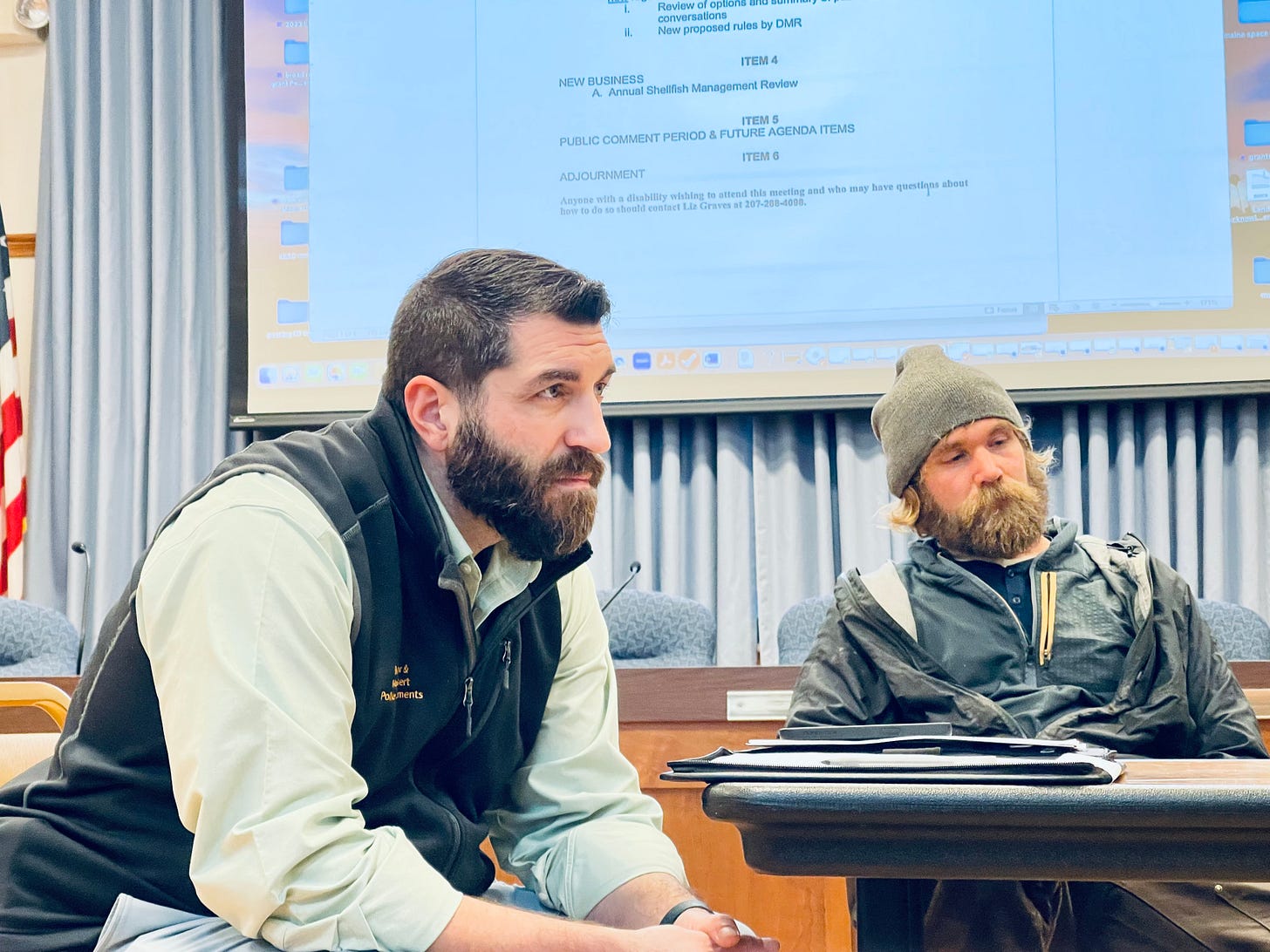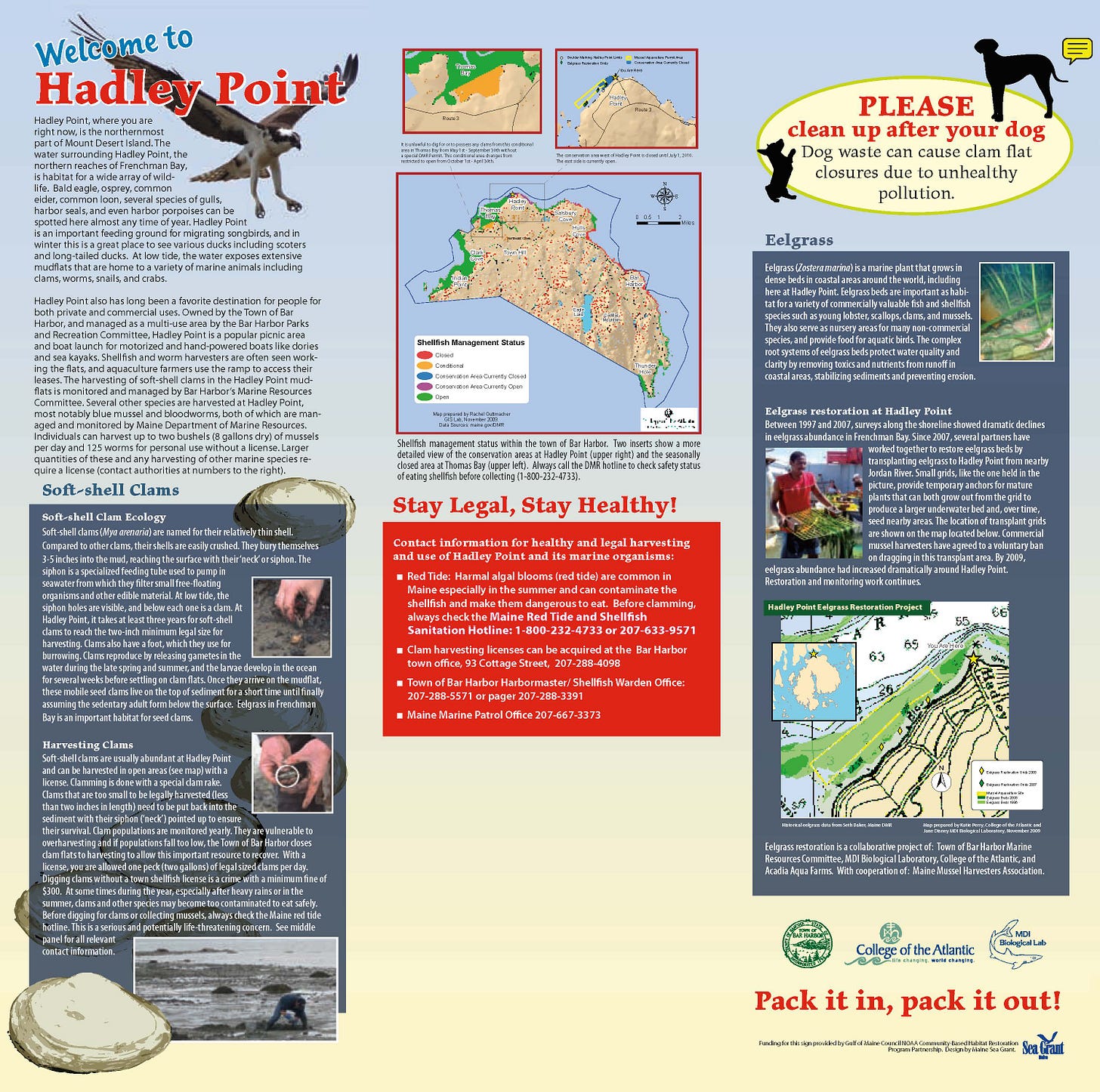Bar Harbor Looks to Licensing Quahogs, Razor and Hen Clams, and Eastern Oysters
Local harvester worries about poacher's impact on resource
BAR HARBOR—Soft-shell clams might be getting some company in the town’s Shellfish Conservation Ordinance. That means that commercial harvesters would need a license to harvest quahogs, razor clams, eastern oysters, and hen clams in Bar Harbor. Currently, they only need it to harvest soft-shell clams (Mya).
On Wednesday, the attending members of the Marine Resources Committee unanimously asked Chair Chris Petersen to craft language to change the town’s ordinance. The new language would add quahogs, razor clams, eastern oysters, and hen clams.
It would also allow oyster harvesting in the summer, which according to a statement sent by Petersen to papers last week, “will otherwise be prohibited by the state starting in 2024.”
The language must first be crafted, approved by the committee, sent to the Council and go to public hearing.
There were 142 recreational Bar Harbor soft shell clam licenses issued in 2022. One of the committee’s goals is to make sure that the town’s two shellfish wardens would have the ability to engage with harvesters about those four species that are not regulated currently. The need to educate is especially true for recreational harvesters who mostly dig in July and August.
If quahogs, razor clams, eastern oysters, and hen clams are not in the town’s ordinance, the wardens can’t educate people about sea creatures and can’t keep them from wiping out an area in a harvest.
When a harvester gets a shellfish license in Bar Harbor, they get it for a suite of shellfish, not just one. The state’s Department of Marine Resources has new regulations beginning July 1. The committee hopes to have its work done by May, which Shellfish Warden, Harbormaster, and Police Captain Chris Wharff said was ambitious.
Some members of the committee expressed that the hen clams were diminished, razor clams were patchy in spots and that quahogs were mostly located on the Blue Hill Bay side.
Part of the committee’s goal is to make sure that recreational harvesters know how to safely harvest shellfish and hope to expand the education piece around licensing so that people know that shellfish can’t sit in the sun and have to be taken care of in certain ways so that people don’t become ill after consuming them.
Maine allows towns to manage shellfish resources in the intertidal zone. Towns like Bar Harbor must have a plan for that management and set limits on harvesting that cannot be less stringent than the state’s own guidelines. If a town doesn’t have a plan or a group like the Marine Resources Committee, then the state does that management instead. The committee in Bar Harbor is made up of volunteers.
Those volunteers had to answer some questions:
Does the town add the four species to its regulations?
Does the town add a bag limit?
Does Bar Harbor change its fee structure for commercial and recreational licenses?
If the ideas stay true to the February 28 meeting and the changes are approved by the Town Council, then the town would:
Add hen(surf) and razor clams, oysters, and quahogs to the BHMRC ordinance, setting the recreational harvest limit to a 1/2 bushel for hen clams and a peck for a mix of the other species, including soft shell clams.
Change the commercial non-resident harvester amount of 10% resident licenses to unlimited and apply to the Department of Marine Resources to designate Northwest Cove and Clark Coves as conservation areas in order to set a 1 bushel limit on quahogs for commercial diggers in those coves.
The seven hours conservation time will remain for both resident and non-resident commercial harvesters. According to the Bar Harbor ordinance, “Qualifying conservation time includes attending Marine Resources Committee meetings, clam flat population and recruitment surveys, reseeding and any other approved activity. Any member of the Bar Harbor Marine Resources Committee may verify hours for approved activities.”
The current state recreational limits for quahogs, razor clams, and oysters is one peck a day. The state limit for hen or surf clams is three bushels a day. A peck is about half a six-gallon bucket. There are four pecks to a bushel, so a bushel is approximately two six-gallon buckets.
Both Northwest Cove and Clark Cove are accessible to recreational harvesters and according to the minutes for the committee’s January 17 meeting, “Eastern oysters have decreased dramatically there over the last two years. Individuals have told committee members that hen clams have been declining over a long period in the area. Quahogs have had relatively steady denisties in the area, but we have observed high levels of harvesting by individuals in both Clark Cove and Northwest Cove. There is a general concern about the declining abundance of these species and their relatively unregulated harvest within the town.”
POACHERS AND DARK GROUNDS
The discussion grew passionate for David Dunton, a Bar Harbor resident and commercial harvester who worried about not just warmer waters, reseeding stock, and invasive green craps, but also poachers.
“We have major poacher issues. That's our number one threat to this town,” he said.
“They're going for soft shell?” committee member Natalie Springuel asked.
He said they were. He implored the committee, “You're talking about my living.”
He later added, “You're walking on dark grounds right here….The resources in MD are nearly wiped out. You've got a lot of issues you aren't aware of.”
For him, he said, it was important to make sure that there was a resource for future generations.
The committee members asked Dunton, Victor Doyle, and Guila Cardoso, all local harvesters, what amount they needed to harvest to sustain their livelihoods.
To make a living, Duton said, he needs to harvest two bushels a day.
“There's not much left and I've been out here for a long time,” Dunton said about the resource. “I hung on last year and it was a miracle.”
Part of the problem, he said, was a poacher who wiped out flats. “Not only did he steal that number (of clams), he stole the future.” Duton said and he was worried about unregulated overharvesting of soft shell clams as well as illegal overharvesting.
The committee agreed to try unlimited residential licenses as well as unlimited commercial licenses knowing that if the change seemed problematic, the members could review it and tweak again after the season. Doyle worried about inconsistency in the rules.
“If it's your livelihood, you want some assurance that you're going to have a job next year,” he said.
Committee members stressed that they had no intentions of flip-flopping rules, but wanted everyone to know that changes can be made again to refine or tweak the ordinance next year.
PUBLIC MEETINGS ON ZOOM
Doyle also said that many people wanted to be able to attend the meeting, but were unable to because of other commitments and had hoped that it would be on Zoom. The committee is going to look into Zoom options. Currently, the town does not keep Zoom recordings for after-the-event viewings. Meetings on Town Hall Streams are recorded and can be viewed afterward.
LINKS TO LEARN MORE
The proposed state changes at www.maine.gov/dmr/rules-enforcement/regulations-rules/proposed-rulemaking (Chapters 4, 7 and 115)
The town’s current license page.
The Bar Harbor Marine Resources Committee page.
Committee’s Chapter 170 Shellfish Conservation
Bar Harbor’s 2023 Shellfish Management Plan
Maine’s Municipal Shellfish Management Manual
Community-based eelgrass (Zostera marina) restoration in Frenchman Bay by Jane Disney and George Kidder. A 2010 Mount Desert Island Biological Bulletin paper on an eelgrass restoration project initially funded by a Gulf of Maine Council grant written by the marine resource committee.
Do current recruitment enhancement methods increase juvenile soft-shell clam (Mya arenaria) recruitment in an intertidal clam flat? is a 2009 report that was part of a College of the Atlantic student senior project by Sarah Drerup.
Resource management in a small Maine town: monitoring, conserving, and managing clam flats in Bar Harboris a 2007 report that was the basis of a College of the Atlantic student senior project by Kipp Quinby.
Clam surveys and management in Bar Harbor is a 2003 report by College of the Atlantic students Kipp Quinby and Nina Therkildsen.













